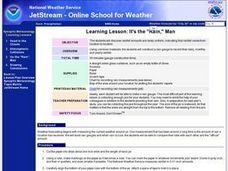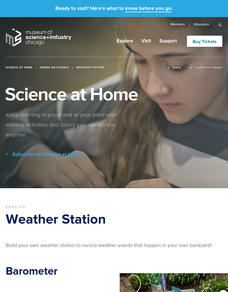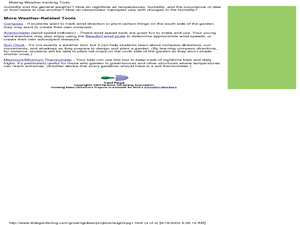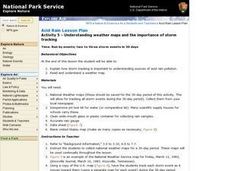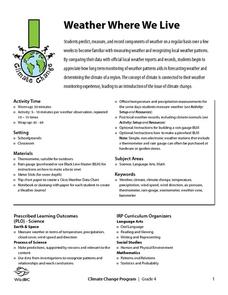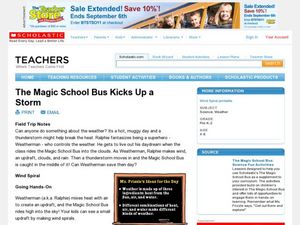Curated OER
Build a Rain Gauge
Learners use a glass container, coat hanger, measuring spoons, and more to make their own rain gauge. In this rain gauge lesson plan students measure the rain.
Curated OER
Testing the Accuracy of a Rain Gauge
Students identify and test variables that may affect the accuracy of a rain gauge. They share findings of their research with the class in a 'mini-meteorology-convention'. They design an experiment with a control setup to test their...
Curated OER
Learning Lesson: How To Make A Rain Gauge
Students discover that rainfall amounts are rarely uniform which means the amount of rain is different from location to location. They construct their own rain gauge using everyday materials.
American Museum of Natural History
Make Your Own Weather Station
Scholars build a weather station equipped with a wind vane, rain gauge, and barometer. Following an informative page about the weather, learners follow steps to build their pieces then turn into meteorologists to chart the weather they...
Teach Engineering
Backyard Weather Station
Challenge young meteorologists to apply their knowledge of weather to build their own weather stations. The resource provides the directions to build a weather station that contains a wind vane, barometer, thermometer, and rain gauge....
Curated OER
Testing the Accuracy of a Rain Gauge
Young scholars identify and test variables that may affect the accuracy of a rain gauge.
NOAA
How Do We Know?: Make Additional Weather Sensors; Set Up a Home Weather Station
Viewers learn about three different weather measurement tools in installment five of the 10-part Discover Your Changing World series. They build weather vanes to collect data on wind speed, barometers to determine air pressure, and rain...
Museum of Science
Weather Station
Find out what it is like outside before braving the elements. Teachers follow directions to build a barometer, rain gauge, and anemometer. Class members use the built weather instruments along with a thermometer to record weather...
Curated OER
Drip... Drop... Raindrops
Students demonstrate the steps of evaporation, cloud formation, and precipitation within the water cycle. They make and demonstrate how to use a hygrometer to record daily humidity and describe how rain, snow, and sleet form.
Curated OER
Making Weather-Tracking Tools
Students build tools to help track the weather. In this weather lesson, students follow directions to build a rain gauge, barometer and hair hygrometer.
K12 Reader
What's the Forecast?
Rain gauges, thermometers, and wind vanes. After reading a short article about weather forecasting, readers identify the tools meteorologists use to predict the weather.
Curated OER
How Acid Rain is Measured and Monitored in the U.S.
Explain how acid rain is measured. They discover how acid rain is monitored in the United States. They compare locally measured pH or rain with that of Great Smoky mountains. They perform Ph tests on rainfall they collect.
Curated OER
Weather Instruments
Middle school meteorologists get acquainted with basic weather instruments: the thermometer, barometer, psychrometer, and anemometer. For each, the question is asked, "Do you think you can make a _______________?" At these points, you...
Curated OER
Understanding Weather Maps and the Importance of StormT
High schoolers explain how storm tracking is important to understanding sources of acid rain pollution. The read and explain a weather map. They set up plastic or glass collection container for rain in an open area away from buildings...
Wild BC
Weather Where We Live
Over a span of two weeks or more, mini meteorologists record weather-related measurements. What makes this particular resource different from others covering similar activities are the thorough details for the teacher and printables for...
Captain Planet Foundation
Shape Shifters in the Math Garden
Combines mathematical measurement with gardening skills. Third graders hunt for worms in the garden and try to find the longest one. They also measure and weigh vegetables that they harvest from the garden, measure rainfall amounts, and...
Curated OER
The Magic School Bus Kicks Up a Storm
Students learn along with Ms. Frizzle's class. In this Magic School Bus lesson plan, students discover small updrafts by making wind spirals.
Curated OER
What is Weather?
Students identify different types of weather and explore the weather for each season of the year. They complete a class seasonal weather chart, listen to the book "Oh Say Can You Say What's the Weather Today?," and create a magazine...
Curated OER
The Magic School Bus Kicks Up a Storm
Young scholars investigate how warm air from a lamp affects a spiral of paper. They determine how the warm air rises while cooler air moves into take its place which creates wind in this Magic School Bus activity.
Curated OER
Weather Watchers
Students watch the weather. In this science observation lesson, students collect data regarding the local weather and create their own weather forecasting video.
Curated OER
Using Solar Energy
Students experiment to determine the effect of solar energy on the temperature of water. In this renewable resources lesson, students measure the temperature of water in a flask that is exposed to sunlight. They relate their results to...




